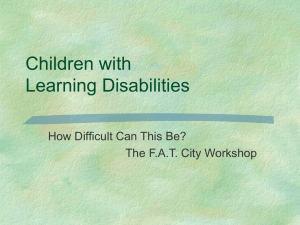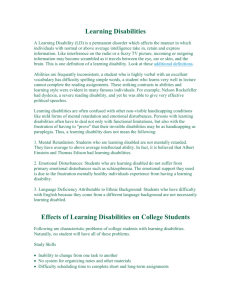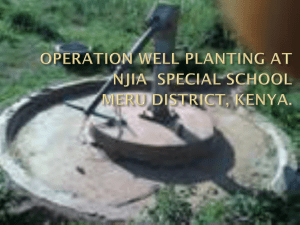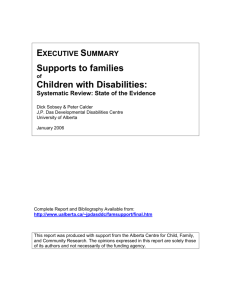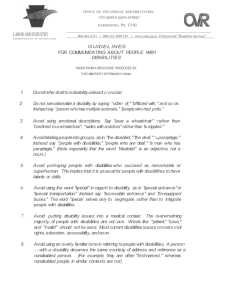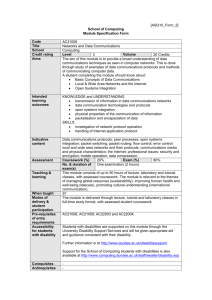Working with children with disabilities
advertisement
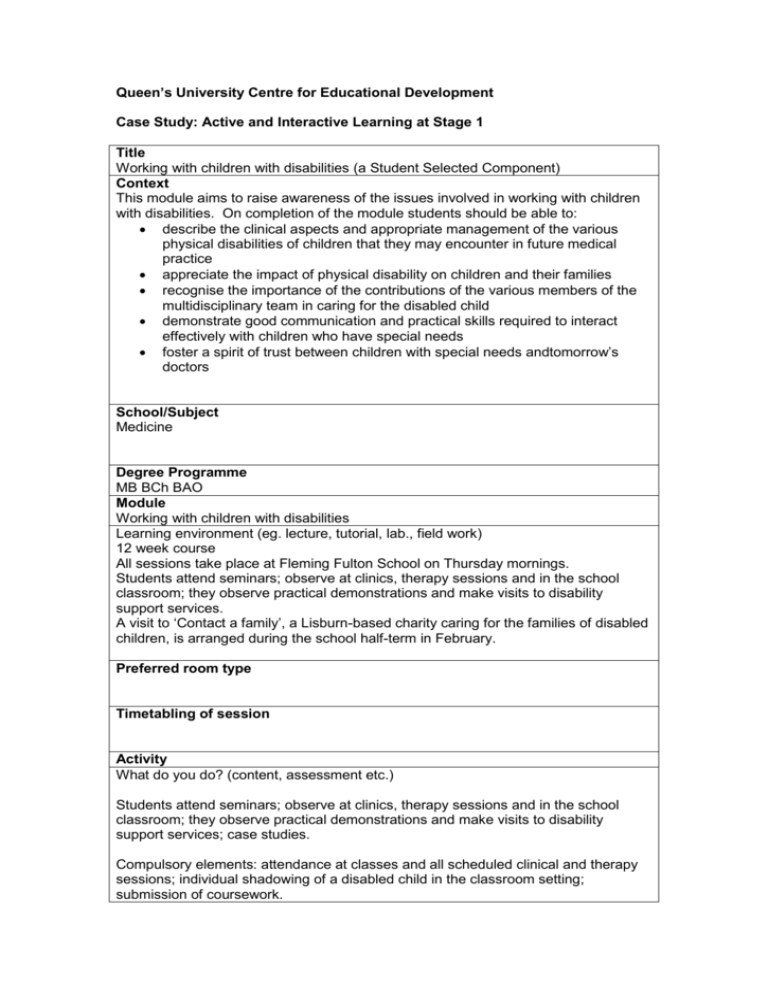
Queen’s University Centre for Educational Development Case Study: Active and Interactive Learning at Stage 1 Title Working with children with disabilities (a Student Selected Component) Context This module aims to raise awareness of the issues involved in working with children with disabilities. On completion of the module students should be able to: describe the clinical aspects and appropriate management of the various physical disabilities of children that they may encounter in future medical practice appreciate the impact of physical disability on children and their families recognise the importance of the contributions of the various members of the multidisciplinary team in caring for the disabled child demonstrate good communication and practical skills required to interact effectively with children who have special needs foster a spirit of trust between children with special needs andtomorrow’s doctors School/Subject Medicine Degree Programme MB BCh BAO Module Working with children with disabilities Learning environment (eg. lecture, tutorial, lab., field work) 12 week course All sessions take place at Fleming Fulton School on Thursday mornings. Students attend seminars; observe at clinics, therapy sessions and in the school classroom; they observe practical demonstrations and make visits to disability support services. A visit to ‘Contact a family’, a Lisburn-based charity caring for the families of disabled children, is arranged during the school half-term in February. Preferred room type Timetabling of session Activity What do you do? (content, assessment etc.) Students attend seminars; observe at clinics, therapy sessions and in the school classroom; they observe practical demonstrations and make visits to disability support services; case studies. Compulsory elements: attendance at classes and all scheduled clinical and therapy sessions; individual shadowing of a disabled child in the classroom setting; submission of coursework. How do you do it? (method including tips) Week 1 Induction: welcome by Headmaster and introduction to the Heads of Therapy Departments; historical background to the establishment and development of the school; the school’s present role within the special education service in Northern Ireland; admission procedures including the Statementing Process; a broad and balanced curriculum and transitional arrangements to post school placements; the multi-disciplinary staff team approach; the children’s medical conditions and disabilities with overviews of therapy provision; brief orientation tour of the school. Weeks 2 -3 Awareness raising: participation in a series of small group activities organised by the therapy departments to include overcoming mobility problems, dealing with eating and drinking difficulties and attempting to use forms of non-verbal communication. Opportunity to gain experience of treatment activities within therapy departments eg. communication and feeding difficulties, augmentative communication systems, splinting, access to computers, use of standing frames and other pieces of equipment; getting to know the young people involved in the module Weeks 4 -10 A general introduction to cerebral palsy, Spina Bifida, Muscular Dystrophy and other relevant conditions by allied healthcare professionals. Reference to associated learning difficulties. Then in subsequent sessions an opportunity for more detailed observation and interaction with children of various ages in the classrooms and during therapy sessions. Theory classes and practical sessions will emphasise these conditions and there is one day devoted to other rarer syndromes. There are also opportunities to observe children with other disabilities during the course. Weeks 11 – 12 (concluding phase) Completion of coursework and end of semester assessments. Participation with the young people in end of term activities. Why do you do it that way? Students are able to acquire skills in literature search and retrieval; critical appraisal of scientific papers; computer/IT skills; oral and written communication skills; interpersonal and clinical skills Assessment: 50% written dissertation (3,000 words) on a specific disability/condition 20% end of semester oral presentation based on the dissertation and personal experience gained during the module 30% for reflective journal recording placement with an individual pupil and experiences at the school. Technology (if any) used to support activity (brief description) Evaluation/Reflection/Outcomes How do you know it works? (measures you adopted, student feedback outcomes, staff feedback) Challenges/Issues/Problems Advice and Tips Looking forward Support Material (please upload/attach or give URL) References (if available) Contact Details Module co-ordinators: Dr David Bell (and Mrs Maeve McKibbin, Speech and Language Therapist and Mrs Olwen Bedwell, Occupational Therapist) d.bell@qub.ac.uk Therapeutics and Pharmacology Centre for Medical Education Rm: 01.024A Whitla Medical Building Block 97B Health Sciences Ext. 2244
